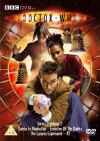The Lazarus Experiment
 |
 |
 |
DVD NTSC
Region 1
14-episode
box set




|
DVD PAL
Region 2
14-episode
box set


|
DVD PAL
Region 2
plain 4-episode volume


|
|
(Doctor Who Story No. 187, starring David Tennant)
- written by Stephen Greenhorn
- directed by Richard Clark
- produced by Phil Collinson
- music by Murray Gold
- 1 episode @ 45 minutes
|
Story: Richard Lazarus believes he has created the
fountain of youth in a laboratory booth, and Martha's sister
arranges a demonstration for some of the world's wealthiest
investors. But what dormant horrors of human DNA has Lazarus
inadvertently let out? And what secrets does his mysterious
political sponsor know about the Doctor?
|
|
DVD Extras (box sets only) include:
- Audio commentary by actors
David Tennant (The Doctor)
and Mark Gatiss (Lazarus).
- Doctor Who Confidential featurette: Monsters Inc. (12 min.) adding
Reggie Yates (Leo Jones),
director Richard Clark,
executive producer Russell T. Davies,
producer Phil Collinson,
prosthetics designer Neill Gorton,
special effects supervisor Mike Crowley,
visual effects producer Will Cohen,
CG supervisor Jean-Claude Deguara, and
stunt co-ordinator Tom Lucy.
- David Tennant's Video Diaries (8 min.) with
Tennant, Gatiss, Clark,
Freema Agyeman (Martha),
Gugu Mbatha-Raw (Tish Jones),
3rd assistant director Sarah Davies, and
costume assistant Kirsty Wilkinson.
- Out-Takes & Bloopers
- Deleted & Extended Scenes
In-Depth Analysis Review
by Martin Izsak
|
|
WARNING: This review contains "SPOILERS", and is intended for
those who have
already seen the program. To avoid the spoilers,
read the Buyers' Guide version instead.
|
Season 29 continues to coast complacently through its most uninspired
material, formulaically going through many motions that were never a good
idea for the show in the first place. "The Lazarus Experiment" ends up
facing off with
"Evolution of the Daleks" (the previous story),
trying to avoid the lowest ranking of the season.
Firstly, it seems a royal waste of time to still be debating Martha's
status as the new companion half-way into the season. More than that,
why are we doing it in present day London, while being treated to another
episode of her not-very-interesting family? Spending time with the previous
companion's family in the past two years was not a great idea for a sci-fi
series, but had the novelty of never having been done in the 26 years prior
to that, and only worked because the characters, casting, and chemistry
managed to create a bit of magic and charm. The formulaic attempt to
replace and recreate all that falls flat here, not only because we don't
have that charm, but also because it's not a great idea, and it's time
for Doctor Who to move on to a whole new companion dynamic. It should
be enough that Martha's on board the TARDIS. Now take us across the galaxy.
But no, here we are stuck on Earth, in London, present day, debating
what else? - the human race. Been there, done that, and far too often
since 2005. It's kind of cheesy and impractical to bring the TARDIS
right into Martha's flat. Really, how many people would have an apartment
or other living space that small with an empty space in the middle big enough
and tall enough to hold a police box? Unless they had planned it prior,
which Martha had never had an opportunity for. The indecisive twaddle
of the scene in the apartment allows for a full demonstration of the
TARDIS materializing in addition to a scene in its interior, but this
doesn't go far for making up for the silliness of the Doctor and Martha's
dynamic here.
|
This story uses both established versions of Martha's Theme and
new stylistic variations and developments that are sadly not represented
on the season's official music CD release. Another excellent new piece
backs the actual experiment early on in the story. But sometimes, as
in the opening scene, the music seems to be trying too hard and taking
over too much, without really having much to say in this particular tale.
|
Music by Murray Gold
"Martha's Theme"
is available on:
|
|
The episode earns its sci-fi stripes and gains its quality from
its opening sections, during which Professor Lazarus' idea and experiment
are put on screen. Excellent concept, the "fountain-of-youth" machine.
A few too many wild CGI movements around the booth itself to remain
believable for me, but decently satisfying nonetheless. I'm not too
sure that keeping the concept a mystery until Lazarus steps out of the booth
was a great idea, because anticipation of something worthwhile is not as
high as it should be to make it work.
However, it does perhaps help to sell Lazarus as an old man in the
beginning. I was convinced I was watching an older actor, and one who
seemed strangely familiar. I kept asking myself what it was I might
have seen him in previously. Thus the revelation from the booth was
doubly surprising - not only was the sci-fi process of the story revealed,
so was the fact that Lazarus had been Mark Gatiss all along, and I knew
I'd been had - in a good way.
Gatiss's performance as both the old and young Lazarus is definitely
the highlight of the episode, and he gets some nice meaty scenes to sink
his teeth into. Fantastic. He and David Tennant work well off of each
other and create some great scenes.
However, the youth-experiment idea seems let down by the plot for the
remaining 2/3 of the story, in which the writer(s) fall back on the
formulaic misguided idea that "monsters" need to be the central focus
of a good Doctor Who story. Both the title and the interview questions
of this week's Confidential behind-the-scenes featurette show how deeply
embedded and sadly unquestioned this aspect of the show is becoming, but
thankfully Tennant himself understands what a dumbing-down this is, and
that the Doctor himself would never agree with it.
In short, the third "monster" incarnation of Lazarus is pretty stupid,
a grand CGI mistake that looks as though it has nothing to do with
Lazarus's other two forms despite all their considerable efforts to the
contrary. Going for anything other than a very mild variation of human
stretches credulity way too far, and is totally unnecessary and unsatisfying.
Equally stupid are the number of almost instantaneous transformations
between these wildly different forms. Sorry, this concept went down the
toilet too quickly to save itself.
And speaking of formulaic writing, the patterns of the last two seasons
build up expectation of the major returning threat of this season to show
itself by about this point. I myself was burning to see either the Master
or the Sontarans revealed in this episode. Instead I'd got a bigger overdose
of overused Earth cities, overly predictable Dalek reruns, and the kind of
canned dysfunctional family dynamics that are found on dozens of below
average everyday dramas.
Mention of Mr. Saxon in this story fuels a bit of interest for those
who know where that strain is heading, but ultimately this falls flat and
is an utter waste of time. If you don't already know what it is, it means
nothing to you. If you do know what it is, it's far less than you want,
and remains insignificant. And it drags itself once more through the
British Government, not for reasons of developing a decent conspiracy
plot element, but more for a sense of self-importance that, considering
what Doctor Who's galactic scope should be, actually works to make it seem
smaller-scale instead.
"The Lazarus Experiment" plods on through formulas good and bad,
managing a decent conclusion with excitement and emotion, but little point
or worthwhile development. Tennant gets his heroic due, and one gets the
sense that the ideas here will be further built upon later, although one
suspects that starting over with other ideas may be the better choice.
Although not too bad an episode, most of the rest of the stories this
season have more going for them, and "The Lazarus Experiment" is in serious
danger of receiving the Wooden Turkey Award for worst season 29 story.
International Titles:
Deutsch: "Der Preis der Jugend"
Magyar: "A Lazarus kísérlet"
Français: "L'Expérience Lazarus"
Русский: "Эксперимент Лазаруса"
Italiano: "L'esperimento Lazarus"
This story has become available on DVD.
Click on the Amazon symbol for the location nearest you
for pricing and availability:
 |
 |
 |
DVD NTSC Region 1
14-episode boxed set
for the North American market:




|
DVD PAL Region 2
14-episode boxed set
for the U.K.


|
DVD PAL Region 2
plain 4-episode volume
U.K. format only


|
Note: The full season sets
contain commentaries, behind-the-scenes
featurettes, and other extras.
The smaller volumes only feature the plain episodes.
Comments on this article are welcome. You may contact
the author from this page:
Contact page

LYRATEK.COM
|
Read the In-depth Analysis Review for the next story:
"42"

|
|









